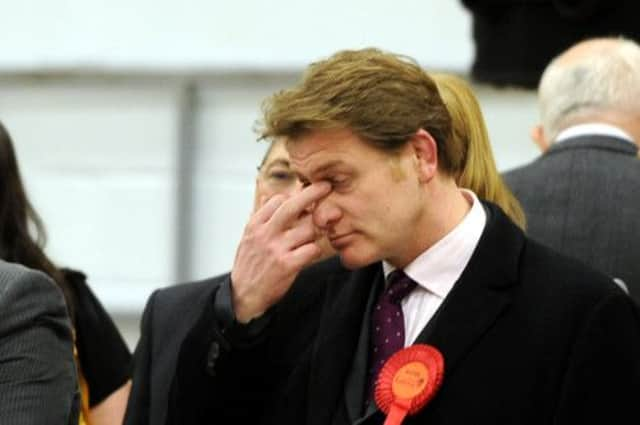Simon Pia: Labour should look to US for answers


Even its proximity to the Bonnybridge Triangle is purely coincidental, but it does happen to be the epicentre of recurring fault lines in the Labour party.
The controversy and consequences of former Falkirk Labour MP Dennis Canavan’s rejection as a Holyrood candidate in 1999 still rumble on. At the time, it was the most high-profile example of New Labour control-freakery and its ambivalent attitude towards the fledgling Scottish Parliament. Canavan was then elected as an independent with the biggest majority in the Scottish Parliament. He has gone on to be a symbol of old Labour disenchantment with New Labour.
Advertisement
Hide AdAdvertisement
Hide AdNow there is the current farce over the selection of a candidate to replace Falkirk MP Eric Joyce – one time the very epitome of the ideal New Labour candidate, an army major no less, when it was bliss in that Blairite dawn to be alive back in 1997.
But Labour’s sorry mess today fulfils every media cliché of a union barons’ stitch-up. The allegations against Unite and its counter-threat of legal action against the party only highlights the dysfunctional relationship between them and the party’s antediluvian structure and procedures. Most sentient members know they are not fit for purpose in 2013 let alone if they ever were in 1913.
The fundamental problem is the unions, and particularly Unite, are the party’s paymasters. While bankers and high finance fund the Tories and they do their bidding with minimal media scrutiny, Labour cannot afford to be seen to have the same relationship with the unions.
Meanwhile, Labour shambles along in a “can’t live with them, can’t live without them” relationship, but the Falkirk farrago poses a serious challenge to Ed Miliband’s leadership and the party’s prospects of returning to power.
What makes the current problem even more convoluted, problematic and embarrassing is both Miliband and Scottish leader Johann Lamont, who not surprisingly is nowhere to be seen in all of this, owe their jobs to the union block vote.
Neither of them won the one-member/one-vote section of Labour’s byzantine electoral college and subsequently, if not beholden to the unions, they are compromised.
Meantime, left-leaning commentators and bloggers wail and gnash their teeth and senior Blairites like Lord Mandelson, David Blunkett and Kim Howells issue dire warnings of electoral suicide. But no-one is offering a long-term solution.
There is one staring at them if they look across the Channel, or even the Atlantic. It is time for Labour to introduce primaries for the selection of candidates and party leader. It is time to rip up the rule book and drag the party into the 21st century.
Advertisement
Hide AdAdvertisement
Hide AdOf course, there are problems attached to primaries but they can be surmounted and suit all sides, including allowing unions to put up their own candidates. The beauty of the system is it is ultimately the public, not the unions or party hierarchy who will decide.
The left and unions who railed against New Labour parachuting in bright young things as candidates from central office should recall that primaries originated in early 20th-century US politics to combat the imposition of candidates by the party hierarchies. Their slogan was “Give Voice to the People”.
In the past decade in Europe, the parties of the left in France and Italy have introduced primaries with candidates winning despite the opposition of the party leadership. They have been accredited with a key role in the Socialist Party in France and PS (Democrats) in Italy’s return to power.
There are many different systems that can be adapted, but open primaries such as in France and Italy, whereby voters declare affiliation or subscribe to the values of the party and pay a small fee (€1) to vote, would probably be more suitable here than the US system. In France, three million citizens took part in the Socialist presidential primaries in 2011.
And, whisper it, even the Tories have tentatively dipped their toe with Sarah Woolaston selected in such a manner as their MP in Totnes. The party in Berwick-upon-Tweed is also considering using a primary to select its 2015 general election candidate.
Supporters of primaries, on both the left and right, believe they not only shift power from the party hierarchy to voters, but also from whips to backbenchers and lead to a more diverse and independent legislature. In one bound, then, Labour could be free from its dilemma. Whether its innate conservatism or vested interests within will prevent the party taking this leap remains to be seen, but you probably wouldn’t bet on it.
Primaries would serve the party particularly well in Scotland. The Holyrood leadership once again chose to look inward rather than reaching out to the country in its decision to protect its current list system for candidates, one that suits career politicians.
Primaries are one area to reconnect the People’s Party to the people. The system can offer a better quality of candidate, people who communicate well with the media and can relate to the public. Two millennium on, the skills and oratory of Cicero are as important as ever to the body politic in making your argument and taking people with you.
Advertisement
Hide AdAdvertisement
Hide AdMore than ever, people want openness and transparency. With this one bold step Labour would not only be doing itself a service, but also the country at a time when disillusionment with mainstream politics is in danger of undermining our democracy.
• Simon Pia is a former Labour media adviser who is now a freelance commentator